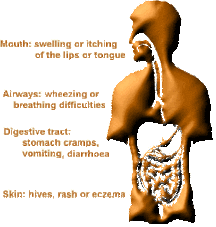Milk and its associated products such as cheese, butter, mayonnaise or yoghurts are popular foods that are considered to be high in proteins and calcium while being tasty at the same time. Most popular foods like pizzas, pastas, sandwiches contain cheese in them to make them taste good while butter and toast is considered as the staple food for the majority of the population. While most people are able to have these as a part of their regular diets, there are others who suffer from milk allergy and have to refrain from these dairy products.
Casein intolerance
Cow's milk has been identified as one of the leading causes for food allergies among children which may lead to nausea, giddiness, diarrhea and other sickness. Adults are equally affected by milk and experience bloating, nausea, gas and heaviness after consumption. Inability to digest milk proteins happens to adults who are sensitive to milk and it finally leads to allergies. Allergies related to casein have serious symptoms such as vomiting, stomach cramps, and skin irritation and may lead to anaphylactic reactions in the body. In the long run it leads to weight loss as the patient is unable to absorb any nutrients from any food. Casein intolerance is a much more serious condition than lactose intolerance and can prove to be harmful for health. People who are allergic to casein have to avoid any kind of milk or milk based products since even traces of casein in their food might trigger a reaction.
About casein test
Milk constitutes of two important proteins namely Casein and Whey. Casein is derived from Latin caseus which means milk. It is the most important ingredient in milk and account for more than 80% of proteins in cow's milk and cheese. This phospoprotein is not soluble in water and is the thick part of the milk which helps in setting the curd. Whey is the watery part of milk which makes up nearly 87% of the milk. Some individuals are allergic to the casein in milk which others are sensitive to whey. Casein is found in all milks of mammals, but in varying degrees. A casein test helps in determining if a certain food product contains casein.
Research has shown that a casein free diet is better for autistic children since they are able to digest it much more easily. It is proven to be effective in their overall development. A casein test is very important to determine and label food and drinks which are casein free, since consumption of even traces of this allergen can be very harmful for individuals.
Chemical Intolerance - For over 20 years, the ALCAT Test has provided both patients as well as healthcare professionals with a tool to successfully overcome a wide variety of conditions which result from chemical sensitivity and food intolerance.
Casein Test Article Source: http://EzineArticles.com/3233551




 RSS Feed
RSS Feed